Are Jesus Christ, and Michael the Archangel
the Same Person?
Today I would like to do a study to confirm the identity of Michael the archangel; the meaning, and the purpose of his missions, and the events that take place at these times.
I would like to focus our study on Daniel 12 verse 1 because this verse, once correctly rendered will provide the answers to all the questions that we have asked.
Having completed this study; and upon prayerfully considering the testimony presented in the Scriptures, I have concluded that the person called Michael in this verse, is Jesus Christ Himself; otherwise known as Michael the archangel,and, the captain of the Lords hosts.
archangel
I would like to ask you to read the following with a prayerful, and open heart?
Please bear in mind that I would never suggest, nor do I believe that Jesus Christ is not divine, and not God; for He most certainly is our God, and our redeemer.
“Thus saith the LORD the King of Israel, and his redeemer the LORD of hosts; I am the first, and I am the last; and beside me there is no God.” Isaiah 44:6 (God is our redeemer)
“God and our Saviour Jesus Christ:” 2 Peter 1:1
“In the beginning was the Word, and the Word was with God, and the Word was God.” John 1:1
“And the Word was made flesh, and dwelt among us,…” John 1:14
“God was manifest in the flesh, justified in the Spirit, seen of angels, preached unto the Gentiles, believed on in the world, received up into glory.” 1 Timothy 3:16
“And Thomas answered and said unto him, My Lord and my God.” John 20:28
“…to feed the church of God, which he hath purchased with his own blood.” Acts 20:28
“And from Jesus Christ, …(who) washed us from our sins in his own blood,” Revelation 1:5″
The scriptures contain many more such verses that confirm this to be true.

Michael The Archangel is Jesus Christ-The great Prince Which Stands up for His People
-
Michael The Archangel is Jesus Christ-The great Prince Which Stands up for His People
A study of Daniel 12 verse 1: which, when correctly rendered proves beyond any doubt that Michael the Archangel is Jesus Christ. “And at that time shall Michael stand up, the great prince which standeth for the children of thy people: and there shall be a time of trouble, such as never was since there was a nation even to that same time: and at that time thy people shall be delivered, every one that shall be found written in the book.” Daniel 12:1 Please bear in mind that I would never suggest, nor do I believe that Jesus Christ is not divine, and not God; for He most certainly is our God, our Creator, and our redeemer. “Thus saith the LORD the King of Israel, and his redeemer the LORD of hosts; I am the first, and I am the last; and beside me there is no God.” Isaiah 44:6 (God is our redeemer) “God and our Saviour Jesus Christ:” 2 Peter 1:1 “In the beginning was the Word, and the Word was with God, and the Word was God.” John 1:1 “And the Word was made flesh, and dwelt among us,…” John 1:14 “God was manifest in the flesh, justified in the Spirit, seen of angels, preached unto the Gentiles, believed on in the world, received up into glory.” 1 Timothy 3:16 “And Thomas answered and said unto him, My Lord and my God.” John 20:28 “…to feed the church of God, which he hath purchased with his own blood.” Acts 20:28 “And from Jesus Christ, …(who) washed us from our sins in his own blood,” Revelation 1:5″
Our Study Verse is Daniel 12 verse 1.
“And at that time shall Michael stand up, the great prince which standeth for the children of thy people: and there shall be a time of trouble, such as never was since there was a nation even to that same time: and at that time thy people shall be delivered, every one that shall be found written in the book.” Daniel 12:1
We should begin by breaking down this verse into its various components so that we can
determine the context of each of these different elements individually,
and then establish the meaning being applied collectively.
archangel
“And at that time shall Michael stand up, the great prince which standeth for the children of thy people: and there shall be a time of trouble, such as never was since there was a nation even to that same time: and at that time thy people shall be delivered, every one that shall be found written in the book.” Daniel 12:1
‘At that time’
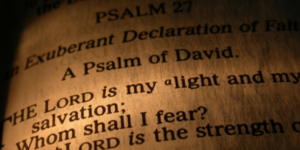 The chapter prior to Daniel 12:1 is Daniel chapter 11 verse 40 which tells us what time is being described.
The chapter prior to Daniel 12:1 is Daniel chapter 11 verse 40 which tells us what time is being described.
“And at the time of the end shall…” Daniel 11:40a
So this is the time of the end that is spoken of.
“…he shall come to his end, and none shall help him.” Daniel 11:45
Daniel 11:45 is the last verse of chapter 11. Revelation 18 outlines the events that will take place when the final judgment falls upon modern Babylon for her sins, when there will be none to help him.
And so, “at that time” refers to the “time of the end”
And so what will happen at that time? archangel
“a time of trouble, such as never was since there was a nation even to that same time:”
“a time of trouble greater than any other since there was a nation” This time of trouble will come upon ALL nations of the world when Christ stands up as King of Kings; this is when the seven last plagues are poured out as described in Revelation 16.
In context; the following verses speak of the same time.
“But the salvation of the righteous is of the LORD: he is their strength in the time of trouble.” Psalm 37:39
The LORD is our strength in THE time of trouble. Not just in our times of trouble, but most importantly; “The Time of Trouble” of the last days.
” O LORD…our salvation also in the time of trouble.” Isaiah 33:2b
(The LORD is our “salvation” in “the” time of trouble)
“O the hope of Israel, the saviour thereof in time of trouble,…” Jeremiah 14:8
(The hope of Israel is our Saviour in the time of trouble)
Each reference is talking of the Messiah being the deliverer- the saviour-the redeemer in the time of trouble, but the big question is “Is Jesus Michael?”
archangel
So what are the results; or the consequence of “standing up” “At that time”?
“…and at that time thy people shall be delivered, every one that shall be found written in the book.”
Daniels people will be delivered if their names are written in the book of life. Revelation 3:5 and 21:27.
The very next verse adds more information.
“And many of them that sleep in the dust of the earth shall awake, some to everlasting life, and some to shame and everlasting contempt.” Daniel 12:2
Here is a resurrection during the time of the plagues.
Scripture shows that these events occur during the second coming of Christ, which is here shown to be when Michael stands up in Daniel 12 verse 1.
If you diligently study the Scriptures then you will know that coincidences are never an option to be considered, and the idea that another being could be given the work that the Bible confirms belongs to Christ alone is repugnant; but none the less, our study has only just begun and we have much more to learn that this verse has to offer.
In my mind, the main reason to pursue this study further is to gather all the information available to our understanding as it will be invaluable to us later when building the foundations that we will set our house upon. archangel
We should now have a better understanding of the time and the events that will transpire at “that time” which is spoken of in Daniel 12:1, we just lack an explicit text that says that it is Michael that is doing the work that we know that Jesus does.
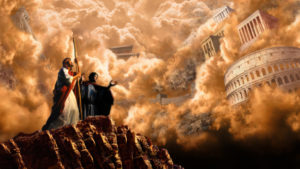 Now we should look at ‘Michael the great prince‘; Who is he, and where else can we find the same terminology in Daniel?
Now we should look at ‘Michael the great prince‘; Who is he, and where else can we find the same terminology in Daniel?
We find it also in Daniel 10:13 “Michael, one of the chief princes”
” But the prince of the kingdom of Persia withstood me one and twenty days: but, lo, Michael, one of the chief princes, came to help me; and I remained there with the kings of Persia. Daniel 10:13.
as well as Daniel 10:21 “Michael your prince.”
“But I will shew thee that which is noted in the scripture of truth: and there is none that holdeth with me in these things, but Michael your prince” Daniel 10:21
The only other time that ‘Michael‘ is mentioned in Daniel is in Daniel 12:1 which is our study verse. The thing that we notice with these three verses is that they all refer to Michael as a Prince; but not just any prince but as “the great prince“, “one of the chief princes“, and most notably “your prince” as Gabriel describes him to Daniel.
So how does the Bible define “Prince” in the context that these verses are applied?
The word “prince” is found 17 times in 16 verses in Daniel
Let’s check Strong’s H8269 as this is the word used in each of the three verses that we have identified; The Hebrew word שַׂר sar, sar; from H8323; a head person (of any rank or class):—captain (that had rule), chief (captain), general, governor, keeper, lord,(-task-)master, prince(-ipal), ruler, steward.
The AKJ Bible translates Strong’s H8269 in the following manner: prince (208x), captain (130x), chief (33x), ruler (33x), governor (6x), keeper (3x), principal (2x), general (1x), lords (1x), miscellaneous (4x).
If Michael is in fact Jesus, it could be appropriate to use any of the above examples when describing Him, if in the correct context.
But what of the phrase “the great prince“? We now have a better understanding of the word “prince“, but what is meant by the “the great prince“?
archangel
“great” is Strong’s H1419
גָּדוֹל gâdôwl, gaw-dole’; or גָּדֹל gâdôl The KJV translates Strong’s H1419 in the following manner: great (397x), high (22x), greater (19x), loud (9x), greatest (9x), elder (8x), great man (8x), mighty (7x), eldest (6x), miscellaneous (44x).
great : large (in magnitude and extent), in number, in intensity, loud (in sound), older (in age),
“in importance“: important things, great, distinguished (of men), God Himself (of God)
In importance is contextually accurate for this application; but, is it of men, or of God?
In context; The meaning here applied is “Great in importance, but not of men, but of God Himself.”
See revelation 1:5
“And from Jesus Christ, who is the faithful witness, and the first begotten of the dead, and the prince of the kings of the earth. Unto him that loved us, and washed us from our sins in his own blood,” Revelation 1:5
Revelation chapter 1 verse 5 is here describing Jesus Christ as the “prince of the kings of the earth.” Making Him the great prince of the people of Daniel, which is the same wording that is used to describe Michael in Daniel 10:1.
Comments on Daniel 10:13. This verse speaks of two princes, the one being the prince of Persia who is the devil and Satan, the other is none other than Jesus Christ: Messiah the Prince which is confirmed in Daniel 9:25.
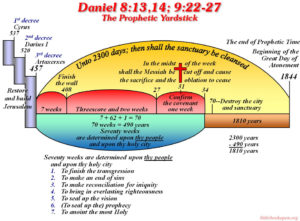 These points will become much clearer as we continue through our study, but I make mention of them here to bring them to your attention.
These points will become much clearer as we continue through our study, but I make mention of them here to bring them to your attention.
“Know therefore and understand, that from the going forth of the commandment to restore and to build Jerusalem unto the Messiah the Prince shall be seven weeks, and threescore and two weeks: the street shall be built again, and the wall, even in troublous times.” Daniel 9:25
So correctly rendered; “great,” in this context means “God Himself”
Before we proceed, I think we should see where else Michael is mentioned in Scripture that could give us more information about this heavenly being.
The first thing that we find is that ‘Michael‘ appears 15 times in 15 verses of the AKJ Bible so it will be easy to identify this heavenly person.
The second thing that we find is that the meaning of “Michael” is “who is like God”
Of the 15 verses that mention “Michael” in the authorized Bible there are only five which speak of a heavenly being; and of these five we have just looked at three of them: Daniel 10:13, 21; and 12:1
Leaving just Jude 1:9, and Revelation 12:7 to consider.
“Yet Michael the archangel, when contending with the devil he disputed about the body of Moses, durst not bring against him a railing accusation, but said, The Lord rebuke thee.” Jude 1:9
“And there was war in heaven: Michael and his angels fought against the dragon; and the dragon fought and his angels,” Revelation 12:7
The word that stands out here in Jude 1:9 is “Archangel”; this word is a title, and if we can determine the meaning of that title then we might be able to make Michael’s person, and His position much clearer.
We must first determine the Biblical meaning of “Archangel”
We find that this word is used just twice in the Bible, once in Jude 1:9 above, and the other is in 1 Thessalonians 4:16.
“Archangel” Is strong’s G743 STRONGS NT 743: ἀρχάγγελος archangel
ἀρχάγγελος, ἀρχαγγέλου, ὁ (from ἀρχι, which see, and ἄγγελος), a Biblical and ecclesiastical word, archangel, i. e. chief of the angels (Hebrew שַׂר chief, prince, Daniel 10:20; Daniel 12:1), or one of the princes and leaders of the angels (הָרִאשֹׁנִים הַשָּׂרִים, Daniel 10:13): 1 Thessalonians 4:16; Jude 1:9.
Here we find that the “Archangel,” is the “Chief of the Angels”
NOTE: We must be sure to understand that this in no way implies that He is one of the created angles, but only that He is the chief of the angels. Just as an archbishop is the head of the bishops. Christ is the commander and chief of His angels which He created.
“For by him were all things created, that are in heaven, and that are in earth, visible and invisible, whether they be thrones, or dominions, or principalities, or powers: all things were created by him, and for him:” Colossians 1:16.
Jesus Christ is the Chief of the angels; and He is God.
archangel
“The Revelation of Jesus Christ, which God gave unto him, to shew unto his servants things which must shortly come to pass; and he sent and signified it by his angel unto his servant John:” Revelation 1:1.
“Sent and signified it by His angel.” Revelation has many examples of the heavenly angels receiving and obeying the commands of Jesus Christ.
If you are not yet convinced that Michael the archangel, and Jesus Christ are one and the same person then please continue, if you are convinced then please continue anyhow as there are far greater rewards in store for you.
archangel
archangel
Lets look now at the only other use of the word “Archangel” that is found in the Scriptures.
1 Thessalonians 4:16, and I think it important to establish the context.
13 But I would not have you to be ignorant, brethren, concerning them which are asleep, that ye sorrow not, even as others which have no hope. 14 For if we believe that Jesus died and rose again, even so them also which sleep in Jesus will God bring with him. 15 For this we say unto you by the word of the Lord, that we which are alive and remain unto the coming of the Lord shall not prevent them which are asleep. 16 For the Lord himself shall descend from heaven with a shout, with the voice of the archangel, and with the trump of God: and the dead in Christ shall rise first: 17 Then we which are alive and remain shall be caught up together with them in the clouds, to meet the Lord in the air: and so shall we ever be with the Lord. 18 Wherefore comfort one another with these words. 1 Thessalonians 4:13-18
“The Lord Himself” shall descend from heaven with a shout, with the “voice of an archangel.”
This is very supportive of the idea that Michael is Jesus Christ, no doubt about it, but does Jesus possibly descend with the sound of the archangels voice, and not use His own voice?
I think we should ask that question.
Here we have John 5:25-29 again for the context.
25 Verily, verily, I say unto you, The hour is coming, and now is, when the dead shall hear the voice of the Son of God: and they that hear shall live. 26 For as the Father hath life in himself; so hath he given to the Son to have life in himself; 27 And hath given him authority to execute judgment also, because he is the Son of man. 28 Marvel not at this: for the hour is coming, in the which all that are in the graves shall hear his voice, 29 And shall come forth; they that have done good, unto the resurrection of life; and they that have done evil, unto the resurrection of damnation. John 5:25-29
“the dead shall hear the voice of the Son of God” and “and they that hear shall live.”
This is pretty compelling; one verse (John 5:25)confirms that they will hear the sound of the voice of the Son of God; the other (1 Thessalonians 4:16) confirms that they will hear the sound of Michael the Archangel.
And when we consider Daniel 12 verse 2 in connection with John 5 verse 29 then we can conclude
that they are the same person as they confirm the same time, and the same event.
“they that have done good, unto the resurrection of life; and they that have done evil, unto the resurrection of damnation. John 5:25-29
“… many of them that sleep in the dust of the earth shall awake, some to everlasting life, and some to shame and everlasting contempt.” Daniel 12:2.
So once more we find confirmation that Jesus Christ is Michael the Archangel.
Now that we have confirmed this idea we should explore the possibility that there are more witnesses to further establish this truth.
We begin with Joshua 5:13-15
“13 And it came to pass, when Joshua was by Jericho, that he lifted up his eyes and looked, and, behold, there stood a man over against him with his sword drawn in his hand: and Joshua went unto him, and said unto him, Art thou for us, or for our adversaries? 14 And he said, Nay; but as captain of the host of the LORD am I now come. And Joshua fell on his face to the earth, and did worship, and said unto him, What saith my lord unto his servant? 15 And the captain of the LORD’S host said unto Joshua, Loose thy shoe from off thy foot; for the place whereon thou standest is holy. And Joshua did so.” Joshua 5:13-15
archangel
To correctly render these verses we need to establish the following.
1) Who was the man with his sword drawn?
2) Who; or what is the “host”?
3) What is meant by “captain”?
4) Why did Joshua fall on his face and worship him?
5) And the significance of the command to ( Loose thy shoe from off thy foot; for the place whereon thou standest is holy).
archangel
#1) Who was the man with his sword drawn?
Verse 14 confirms that he is the “captain of the host of the LORD”
We know this to be Jesus Christ as creator of the LORD’ host, but our research also shows that captain and prince are used interchangeably, and in this context if the word prince were applied we could render the following “the chief Prince of the host of the LORD:” connected to Daniel 10:13, “your Prince of the host of the LORD:” connected to Daniel 10:21. “the Great Prince of the host of the LORD:” connected Daniel 12:1. Remembering that “Great” in context when describing a heavenly being is “of God” as we discovered.
#2) Who; or what is the “host”?
Heavenly and earthy bodies
“Thus the heavens and the earth were finished, and all the host of them.” Genesis 2:1
Hosts on earth: Israel is the LORDS host on earth.
“And it came to pass at the end of the four hundred and thirty years, even the selfsame day it came to pass, that all the hosts of the LORD went out from the land of Egypt.” Exodus 12:41
The Heavenly Host
“And suddenly there was with the angel a multitude of the heavenly host praising God, and saying,” Luke 2:13
“Praise ye him, all his angels: praise ye him, all his hosts.” Psalm 148:2 Confirms that the angels are the heavenly hosts, and that they are God’ creation.
“For by him were all things created, that are in heaven, and that are in earth, visible and invisible, whether they be thrones, or dominions, or principalities, or powers: all things were created by him, and for him:” Colossians 1:16.
Confirming Jesus as the creator of all things including all the host in heaven above, and the earth beneath.
The following identifies the LORD of the hosts, as Jesus Christ.
 “As for our redeemer, the LORD of hosts is his name, the Holy One of Israel.” Isaiah 47:4
“As for our redeemer, the LORD of hosts is his name, the Holy One of Israel.” Isaiah 47:4
“The LORD of hosts is with us; the God of Jacob is our refuge. Selah.” Psalm 46:7
“O LORD God of hosts, how long wilt thou be angry against the prayer of thy people?” Psalm 80:4
“Who is this King of glory? The LORD of hosts, he is the King of glory. Selah.” Psalm 24:10
“Let it even be established, that thy name may be magnified for ever, saying, The LORD of hosts is the God of Israel, even a God to Israel: and let the house of David thy servant be established before thee.” 1 Chronicles 17:24
The heavenly “Host” are the heavenly angels who were created by God.
“Praise ye him, all his angels: praise ye him, all his hosts. Psalm 148:2
The International Standard Bible Encyclopaedia Describes “Lord of Hosts” as
A name or title of God frequently used in the Old Testament, always translated “Yahweh of Hosts” (Yahweh tsebha’oth) in the American Standard Revised Version, since Yahweh, never ‘Adhonay, is used in this phrase. Evidently the meaning of the title is that all created agencies and forces are under the leadership or dominion of Yahweh, who made and maintains them (Ge 2:1; Isa 45:12). It is used to express Yahweh’s great power
“Hosts” is strong’s H6635; The outline of Bible usage is explained as that which goes forth, army, war, warfare, host [army, host]: [host (of organised army)]: [host (of angels)]: [of sun, moon, and stars]: [of whole creation] [war, warfare, service, go out to war]: [service]
In its correct context, Joshua 5:13-15 confirms that this person is the captain of ALL the Lords Hosts: That would be of ALL creation; in heaven, as well as on earth. Which is in harmony with our idea that this is Jesus Christ, also known as Michael the great prince, and the archangel who is here talking to Joshua.
#3) What is meant by “captain“?
The word here used for “captain” is the same word that we found to be used for “Prince” in Daniel 10:13, 21; and our study verse Daniel 12:1
Strong’s H8269 שַׂר sar, sar; from H8323; a head person (of any rank or class):—captain (that had rule), chief (captain), general, governor, keeper, lord,(-task-)master, prince(-ipal), ruler, steward.
This confirms the use of the same word for both “Prince” in Daniel 10:13, 21; 12:1 as well as for “captain” in Joshua 5:14. And harmonizes with our conclusion stated just above.
#4) Why did Joshua fall on his face and worship him?
Joshua knew that he was in the presence of God as soon as he knew that he was talking to the captain of the Lords Host. He was left without any doubt when told to loose his shoe from off his foot because he was standing on Holy ground.
We are not to give worship to any other god; man, or heavenly angel. We are to bow down and give worship to “God” ONLY.
“For thou shalt worship no other god: for the LORD, whose name is Jealous, is a jealous God:” Exodus 34:14
The heavenly angels know not to receive worship from man as all worship is due only to the Creator.
“And I fell at his feet to worship him. And he said unto me, See thou do it not: I am thy fellow servant, and of thy brethren that have the testimony of Jesus: worship God: for the testimony of Jesus is the spirit of prophecy.” Revelation 19:10
Joshua knew that he was in the presence of God; and immediately bowed and gave reverence to Him, what is most noteworthy is that this person did not refuse the worship of Joshua, which he would have done had he been one of God’ created angels, and not God Himself.
Also note that Jesus accepted worship whilst in the flesh without rebuke, because He is God.
“And as they went to tell his disciples, behold, Jesus met them, saying, All hail. And they came and held him by the feet, and worshipped him.” Matthew 28:9
archangel
#5 Which brings us to the direction to: “Loose thy shoe from off thy foot; for the place whereon thou standest is holy“.
“Saying, I am the God of thy fathers, the God of Abraham, and the God of Isaac, and the God of Jacob. Then Moses trembled, and durst not behold. Then said the Lord to him, Put off thy shoes from thy feet: for the place where thou standest is holy ground.” Acts 7:32-33
“And when the LORD saw that he turned aside to see, God called unto him out of the midst of the bush, and said, Moses, Moses. And he said, Here am I. And he said, Draw not nigh hither: put off thy shoes from off thy feet, for the place whereon thou standest is holy ground. Exodus 3:4-5
This person is without doubt Jesus Christ, and the ground where upon Joshua stood was holy ground because he was in the presence of God.
We will discover more by searching the next few verses which are in the following chapter, chapter 6 verses 2-5. This is a continuation of chapter 5 verse 15 as there is no brake in the sequence.
“And the LORD said unto Joshua, See, I have given into thine hand Jericho, and the king thereof, and the mighty men of valour. And ye shall compass the city, all ye men of war, and go round about the city once. Thus shalt thou do six days. And seven priests shall bear before the ark seven trumpets of rams’ horns: and the seventh day ye shall compass the city seven times, and the priests shall blow with the trumpets. And it shall come to pass, that when they make a long blast with the ram’s horn, and when ye hear the sound of the trumpet, all the people shall shout with a great shout; and the wall of the city shall fall down flat, and the people shall ascend up every man straight before him.” Joshua 6:2-5
This is the “LORD” speaking; LORD is here spelled with all caps meaning YHWH, this is the same person who identified himself as the “captain of the host of the LORD” in chapter 5 verses 13-15 which we have just looked at.
And who else would you expect to give the battle directions to the leader of the “men of war“, but the “captain of the LORD’ Host“?
And further proof that these directions were of divine origin is the downfall of Jericho by the sure hand of God.
archangel
Some, or I suppose many will continue with hardened hearts even in light of the evidence provided; they will say, but there is nothing explicit, there is no text that states that Michael is Jesus Christ and all this evidence is only implied.
To these people I say that we are to hear the sure words of God, precept upon precept, line upon line, hear a little, there a little. Many of the most difficult lessons are lessons learned by the weight of evidence. The Bible is its own expositor : One passage of scripture will prove to be the key that will unlock other passages, and in this way light will be shed upon the hidden meaning of the Word. By comparing different texts treating upon the same subject, viewing their different bearing on every side, the true meaning of the Scriptures will be made evident. You must dig in the mine of truth till you find its greatest treasure, and by comparing Scripture with Scripture you will find the true meaning of the text.”
So we have more digging to do for those who may be of a hardened hearts.
For those of you who have come to this point of our study with an open heart the following may have come to your notice, and you may have been convicted by its authority.
But I ask you to please stay with me so that we may continue this study together and be sure that we can garnish all the information presented on this page.
Let’s revisit our study verse again, Daniel 12 verse 1.
“And at that time shall Michael stand up, the great prince which standeth for the children of thy people: and there shall be a time of trouble, such as never was since there was a nation even to that same time: and at that time thy people shall be delivered, every one that shall be found written in the book.” Daniel 12:1
We have begun to break down the various elements of this verse but there is still much more for us to discover.
What have we confirmed to this point?
“At that time” This is the time of the seven last plagues when Jesus returns and raises “…some to everlasting life, and some to shame and everlasting contempt.” Daniel 12:2
“Michael” the archangel: Chief-captain-prince of the LORDS host.
“The Great Prince” One person; Jesus Christ, and Michael the archangel.
“standeth for the children of thy people:” It is the Messiah which stands for the children of His people. (More to come on this shortly)
“A time of trouble, such as never was since there was a nation even to that same time” The seven last plagues spoken of in Revelation 16 will be poured out upon the nations of the earth.
“For, behold, the day cometh, that shall burn as an oven; and all the proud, yea, and all that do wickedly, shall be stubble: and the day that cometh shall burn them up, saith the LORD of hosts, that it shall leave them neither root nor branch.” Malachi 4:1
“Which I have reserved against the time of trouble, against the day of battle and war?” Job 38:23
“But the salvation of the righteous is of the LORD: he is their strength in the time of trouble.” Psalm 37:39
At the time of trouble ” the dead shall hear the voice of the Son of God: and they that hear shall live.” It is most importance to note that this group who hears His voice at this time is everyone whose names are written in the book. “every one that shall be found written in the book“. But, if we consider the next verse it tells us that some who hear, and that are raised up, are raised up “to shame and everlasting contempt.” (This will make a glorious study for those who believe themselves ready to venture down this path)
There is one significant component from the verse that we have yet to consider, and now would be an appropriate time to look at the two words that we have neglected thus far.
The words “stand up“: This is that action that Michael does at that time, that is at the time of the end when all those whose names are written in the book are raised up.
What does it actually mean when Michael stands up? If we search the book of Daniel for similar occurrences of these words we find that they are used quiet extensively.
The words “stand up” are used 34 times in 15 verses; and the very same Hebrew word is used every time.
The word is Strong’s H5975: Of the total of 512 uses in the AKJ Bible we find the following uses. archangel
עָמַד ʻâmad, aw-mad’; a primitive root; to stand, in various relations (literal and figurative, intransitive and transitive):—abide (behind), appoint, arise, cease, confirm, continue, dwell, be employed, endure, establish, leave, make, ordain, be (over), place, (be) present (self), raise up, remain, repair, serve, set (forth, over, -tle, up), (make to, make to be at a, with-) stand (by, fast, firm, still, up), (be at a) stay (up), tarry.
Clearly there are many different uses that can be applied to this word under different circumstances, depending on context, so lets study out the way in which these words are applied in Daniel in each of these occurrences.
The first of these is in Daniel 8:22, then we find it again in 8:23, and once more in 8:25, so we should look at verse 20 through to verse 26 for the context and application.
20 The ram which thou sawest having two horns are the kings of Media and Persia. 21 And the rough goat is the king of Grecia: and the great horn that is between his eyes is the first king. 22 Now that being broken, whereas four stood up for it, four kingdoms shall stand up out of the nation, but not in his power. 23 And in the latter time of their kingdom, when the transgressors are come to the full, a king of fierce countenance, and understanding dark sentences, shall stand up. 24 And his power shall be mighty, but not by his own power: and he shall destroy wonderfully, and shall prosper, and practise, and shall destroy the mighty and the holy people. 25 And through his policy also he shall cause craft to prosper in his hand; and he shall magnify himself in his heart, and by peace shall destroy many: he shall also stand up against the Prince of princes; but he shall be broken without hand. 26 And the vision of the evening and the morning which was told is true: wherefore shut thou up the vision; for it shall be for many days.” Daniel 8:20-26
These verses repeat and expand verses 4 through 8 of Daniel’s vision of chapter 8. The two-horned ram which Daniel had seen in his vision represents the kingdom of Medo-Persia. The rough goat represents Greece, and the goat’s prominent single horn represents Alexander the Great who was the first king of Greece.
When the “great horn” was broken (Alexander’s premature death), four horns came up in its place on the rough goat. “Four kingdoms shall stand up out of [Alexander’s dominion], but not in his power.” his four Generals took over the Grecian Kingdom by dividing it into four pieces. They did not do this in the same power as Alexander who obtained it by force, they simply divided it into four pieces after receiving it from Alexander after his death, or at least the death of his sons. These four kings would rule “towards the four winds of heaven, (Daniel 8:8)” in all directions of the compass.
In fulfillment of this prophecy the four kingdoms that stood up were [1] Ptolemy Lagides who ruled the southern territories in Egypt, [2] Lysimachus who ruled Asia Minor in the north, [3] Seleucus who took control of the eastern territories from Syria to India, and [4] Cassander who took Macedonia and Greece in the west.
It is important to note that the use of the words “stand up“, here refers without any doubt to the standing up of these “Kings” in each of these territories when they took control and dominion of these kingdoms.
The next of these verses; Daniel 8:23-25 should be pursued as a study in their own right, but sadly this is outside the limits of our study of Daniel 12:1. I will only say that many scholars have incorrectly applied a preterits perspective to these verses which is an incorrect method of interpreting prophecy; so we must stay true to Biblical Hermeneutics by using the historical method that Scripture demands.
Let’s look at these verses on their own.
23 And in the latter time of their kingdom, when the transgressors are come to the full a king of fierce countenance, and understanding dark sentences, shall stand up. 24 And his power shall be mighty, but not by his own power: and he shall destroy wonderfully, and shall prosper, and practise, and shall destroy the mighty and the holy people. 25 And through his policy also he shall cause craft to prosper in his hand; and he shall magnify himself in his heart, and by peace shall destroy many: he shall also stand up against the Prince of princes; but he shall be broken without hand. Daniel 8: 23-25
The latter time of their kingdom puts us at the end of the period of the four divisions which arose out of Alexander’s Kingdom. (Greece)
When the transgressors are come to the full: This points to the reference in Daniel 2 that God sets up and removes kings. All powers are given ample opportunity to accept and serve the Living God. If they choose to disobey then their cup of iniquity is filled, and others are setup in their place. This also confirms that God’ people, who were constantly coming under divine retribution for their sins and apostasy were never more corrupt, than at the time they came under Roman rule. Thus, this transgression could also refer to the Jews.
A king of fierce countenance: This is Rome, referenced in verse 9. Study Deuteronomy 28:45-57 and you will see the connection.
Understanding dark sentences: They shall not understand the language. The native language of Rome is Latin, the Palestinians were familiar with the Chaldean, Persian and Greek languages; but not Latin.
Shall destroy wonderfully: Points to the destruction of Jerusalem, as well as the destruction of God’ faithful people who would be persecuted under both pagan, and Papal Rome.
Through his policy also he shall cause craft to prosper in his hand: Rome is identified above all other powers for a policy of craft. A policy of deceit and fraud is how it brings many of this world under its control. That was true of pagan Rome, and it is true today of Papal Rome.
By peace shall destroy many: Many of the nations that became provinces under the Roman Empire did so by treaty, alliance and bequeathment. This is what we see continuing today.
Stand up against the Prince of princes: Points to the cross, and the fulfillment of the Messianic prophecy of Genesis 3:15.
Broken without hand: Broken without hand is an allusion to Daniel 2 verse 45 when Jesus comes to smite the image of Nebuchadnezzar’s dream which represents all the Kingdoms of earth since the reign of Nebuchadnezzar in Babylon, until Jesus comes to set up a Kingdom that will stand forever.
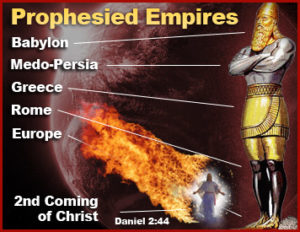 “Forasmuch as thou sawest that the stone was cut out of the mountain without hands, (Jesus is the stone that was cut out without hands Genesis 49:24) and that it brake in pieces the iron, the brass, the clay, the silver, and the gold; the great God hath made known to the king what shall come to pass hereafter: and the dream is certain, and the interpretation thereof sure.” Daniel 2:45
“Forasmuch as thou sawest that the stone was cut out of the mountain without hands, (Jesus is the stone that was cut out without hands Genesis 49:24) and that it brake in pieces the iron, the brass, the clay, the silver, and the gold; the great God hath made known to the king what shall come to pass hereafter: and the dream is certain, and the interpretation thereof sure.” Daniel 2:45
“… and the stone that smote the image became a great mountain, and filled the whole earth.” Daniel 2:35.
That stone being Christ Jesus when He comes in power and glory as King of Kings and Lord of Lords.
“And in the days of these kings shall the God of heaven set up a kingdom, which shall never be destroyed: and the kingdom shall not be left to other people, but it shall break in pieces and consume all these kingdoms, and it shall stand for ever.” Daniel 2:44
In harmony with our previous rendering of “stand up,” from Daniel 8:22, we find the same meaning when we see how the words are applied in verse 23 of chapter 8.
The use of “stand up” in verse 25 however refers to going to battle and being defeated; i.e. “being broken without hand“, whereby his kingdom is lost, and he does not get to stand up. This power stands against the Prince of Princes in an attempt to retain the kingdom which he claimed from Adam in the garden when he caused death to come upon the whole world; but he fails in this attempt at the cross which is prophesied in Genesis 3:15, and also at the time of the end which is prophesied in Daniel 2:34-35 where he is defeated for the last time and all his kingdoms on earth are ground to powder.
The next use of “stand up” is in Daniel chapter 11 verse 2 archangel
Chapter 11 is a most difficult chapter to decipher; it covers many historical events over a lengthy time period from Medo Persia in 530BC, when Cambyses stands up after Cyrus, all the way down to the overthrow of Jerusalem, and then to the time when “he shall come to his end, and none shall help him.” Daniel 11:41. This is at the time of Christ’ return, and the time that Michael stands up in Daniel 12 verse 1 as we discovered at the beginning of this study. This chapter is another study in it’s own right, but I think it appropriate to provide some explanatory notes where it might be helpful for the reader to better understand the events that are unfolding so that we can establish the context and the meaning of the words “stand up”.
archangel
The following verses of Daniel 11:2-4 are parallel with the prophecies of Daniel 8:2-8, and Daniel 8:21 and 22, but with added information.
“And now will I shew thee the truth. Behold, there shall stand up yet three kings in Persia; and the fourth shall be far richer than they all: and by his strength through his riches he shall stir up all against the realm of Grecia.” Daniel 11:2
This is parallel to Daniel 8:20 with more information regarding the kings that ruled during the time of Medo Persia.
These three kings, or at least the territories that these kings conquered, (Lydia, Egypt, and Babylon) are represented by the three ribs in the bears mouth of Daniel 7 verse 5
“And behold another beast, a second, like to a bear, and it raised up itself on one side, and it had three ribs in the mouth of it between the teeth of it: and they said thus unto it, Arise, devour much flesh.” Daniel 7:5
The bear of Daniel 7 verse 5 is Medo Persia, which is the same power represented by the ram in Daniel 8 verse 3.
“Then I lifted up mine eyes, and saw, and, behold, there stood before the river a ram which had two horns: and the two horns were high; but one was higher than the other, and the higher came up last.” Daniel 8:3
The connection here is the bear of Daniel 7:5 which is raised up on one side and represents the rising and dominating power of the Persians over the Medes, this is parallel to the second horn of the ram being higher, and coming up last.
Scripture confirm this to be true.
“The ram which thou sawest having two horns are the kings of Media and Persia” Daniel 8:20
Cyrus the Mede took Babylon in 538BC, (Daniel 5 describes this prophecy and the events of that same night when Babylon falls to the Medes) the three kings who followed were Cambyses II, Smerdis, and Darius the Great.
“And a mighty king shall stand up, that shall rule with great dominion, and do according to his will.” Daniel 11:3
The fourth king who was Xerxes was the husband of Ester, he was indeed wealthier than his predecessors and was the last king of Persia to invade Greece. (Last words of Daniel 11:2)
The mighty King shall stand up; that is he becomes King and takes the reins of his Kingdom and rules with great dominion and does according to his will.
As a note of importance; Xerxes, the fourth king was assassinated and was succeeded by his son Artexerxes who is most recognized by students of prophecy as the king who gave the decree to restore and rebuild Jerusalem in 457BC. (Ezra 7:11-26) Which is the beginning point for the twenty three hundred day prophecy of Daniel 8:14.
We continue to our next verse. archangel
“And when he shall stand up, his kingdom shall be broken, and shall be divided toward the four winds of heaven; and not to his posterity,
nor according to his dominion which he ruled: for his kingdom shall be plucked up, even for others beside those.” Daniel 11:4
archangel
He stands up as King but he is broken: A reference to the broken horn on the goat of Daniel 8:21-22 when Alexander dies and his kingdom is divided between his Generals as explained earlier.
Once again the King stands up to take the reins of his Kingdom.
Next verse.
“But out of a branch of her roots shall one “stand up‘ in his estate, which shall come with an army, and shall enter into the
fortress of the king of the north, and shall deal against them, and shall prevail:” Daniel 11:7
“Branch of her roots” – Her roots refers to Berenice’s roots, which is her father Ptolemy Philadelphus.
“stand up in his estate” – One was to stand up in Ptolemy’s estate/office. This was his son, Berenice’s brother, Ptolemy Euergetes.
Euergetes means benefactor. He stood up and was now seated on his throne.
Next verse. archangel
“And in those times there shall many stand up against the king of the south: also the robbers of
thy people shall exalt themselves to establish the vision; but they shall fall.” Daniel 11:14
In this context the many will stand against the king of the south, to go against him in battle, but they will fall and not receive the kingdom.
Next verse.archangel
“Then shall stand up in his estate a raiser of taxes in the glory of the kingdom: but within few
days he shall be destroyed, neither in anger, nor in battle.” Daniel 11:20
Augustus Caesar was to stand up as the raiser of taxes when his Uncle Julius Caesar died.
“And it came to pass in those days, that there went out a decree from Caesar Augustus,
that all the world should be taxed. (And this taxing was first made when Cyrenius was governor of Syria.)
And all went to be taxed, every one into his own city.” Luke 2:1-3
Neither in anger, nor in battle – Augustus died peacefully in his bed at Nola, where he had gone to seek repose and health. In August 19, 14 A.D. at the ninth hour of the day he died. 35 days before his 75th year of age. There is some implication that his fourth wife, Livia, poisoned him to have her son, Tiberius, rule in his stead.
Standing up into the position as the raiser of taxes is contextually accurate for our purposes. archangel
“And in his estate shall stand up a vile person, to whom they shall not give the honour of the kingdom:
but he shall come in peaceably, and obtain the kingdom by flatteries. Daniel 11:21
“In his estate shall stand up (He stood up to take the position of Roman Emperor) a vile person…” This title rightly fits Tiberius for he was a vile, wicked, cruel, and licentious person. He stood up in his estate as Emperor of Rome but they gave him not the honor of the Kingdom for the people of Rome despised him and dishonored him.
And the very last verse is Daniel 12:1, our study verse.
I trust that if you have made it to this point in our study that you have both enjoyed it as I did while going through it, and likewise now appreciate the significance of the words “stand up,” most specifically when applied to Daniel 12:1 when Michael stands up.
“And at that time shall Michael stand up, the great prince which standeth for the children of thy people:
and there shall be a time of trouble, such as never was since there was a nation even to that same time:
and at that time thy people shall be delivered, every one that shall be found written in the book.” Daniel 12:1
We can now see that Michael stands up as Lord of Lords and King of Kings, who standeth up for the children of Daniels people at the time of trouble when His people are delivered, everyone who is found written in the book of life.archangel

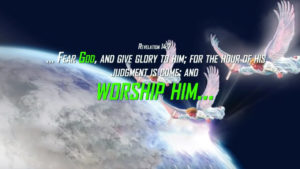
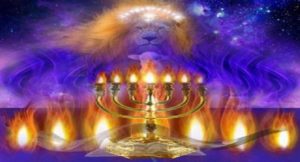
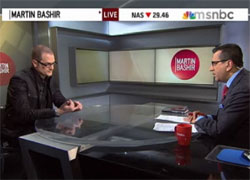
 In Chapter Four of Love Wins, Bell criticizes some statements of faith that he has taken from evangelical church websites that reflect Jesus’ teachings on Hell: “The unsaved will be separated forever from God in hell.” After giving a number of examples with which he feels uncomfortable, Bells states,
In Chapter Four of Love Wins, Bell criticizes some statements of faith that he has taken from evangelical church websites that reflect Jesus’ teachings on Hell: “The unsaved will be separated forever from God in hell.” After giving a number of examples with which he feels uncomfortable, Bells states, 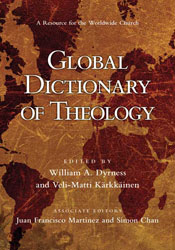 The emergent-friendly, Global Dictionary of Theology, makes a distinction between ‘Hopeful Universalism’ and ‘Convinced Universalism’:
The emergent-friendly, Global Dictionary of Theology, makes a distinction between ‘Hopeful Universalism’ and ‘Convinced Universalism’: Indeed, in the very preface of Love Wins, Bell contradicts Jesus’ teaching that few would actually be saved. Bell writes:
Indeed, in the very preface of Love Wins, Bell contradicts Jesus’ teaching that few would actually be saved. Bell writes: It is a sobering thought that Jesus went on to state in the verses immediately following His teaching on the narrow and broad roads, that false prophets would come in sheep’s clothing (Matthew 7:15-21). Such false prophets stand at the cross roads between the broad and narrow road, claiming to represent Christ, while pointing their followers toward the broad road that leads destruction, assuring them that it eventually leads to Heaven. Consider this for a minute. Isn’t this exactly what Rob Bell is doing?
It is a sobering thought that Jesus went on to state in the verses immediately following His teaching on the narrow and broad roads, that false prophets would come in sheep’s clothing (Matthew 7:15-21). Such false prophets stand at the cross roads between the broad and narrow road, claiming to represent Christ, while pointing their followers toward the broad road that leads destruction, assuring them that it eventually leads to Heaven. Consider this for a minute. Isn’t this exactly what Rob Bell is doing? Rob Bell not only redefines Hell by teaching that it will only be a temporary abode for those who want to leave later, but he redefines Hell by claiming that it is not so much about the after life, but it’s about what you make of the life here and now. In his book, Velvet Elvis, Bell had already stated this position:
Rob Bell not only redefines Hell by teaching that it will only be a temporary abode for those who want to leave later, but he redefines Hell by claiming that it is not so much about the after life, but it’s about what you make of the life here and now. In his book, Velvet Elvis, Bell had already stated this position: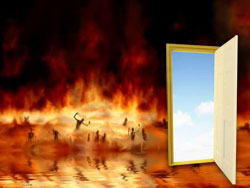 Rob Bell takes every possible liberty to deny reality and to either explain Hell away or get everyone into Heaven, regardless of his or her rejection of God and the Gospel. Bell not only empties Hell of God’s holy wrath, he creates an exit door from the inside out and claims that Hell is merely what we make it. He also claims that most of the imagery of future judgments in Hell were fulfilled on earth in AD 70 (p. 81).
Rob Bell takes every possible liberty to deny reality and to either explain Hell away or get everyone into Heaven, regardless of his or her rejection of God and the Gospel. Bell not only empties Hell of God’s holy wrath, he creates an exit door from the inside out and claims that Hell is merely what we make it. He also claims that most of the imagery of future judgments in Hell were fulfilled on earth in AD 70 (p. 81).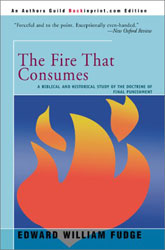 By claiming that the unrepentant wicked will have a chance to get to Heaven from Hell, Rob Bell has gone beyond that of Edward W. Fudge, who states in The Fire That Consumes,
By claiming that the unrepentant wicked will have a chance to get to Heaven from Hell, Rob Bell has gone beyond that of Edward W. Fudge, who states in The Fire That Consumes, 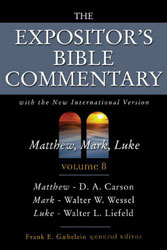 Biblical Scholar D.A. Carson, commenting on Matthew 25:46, says :
Biblical Scholar D.A. Carson, commenting on Matthew 25:46, says :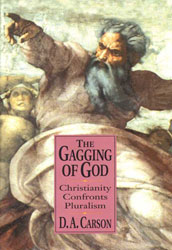 “What is hard to prove, but seems to me probable, is that one reason why the conscious punishment of hell is ongoing is because sin is ongoing.”
“What is hard to prove, but seems to me probable, is that one reason why the conscious punishment of hell is ongoing is because sin is ongoing.” There is hardly any wiggle room for a second chance in hell in these passages or anywhere in Scripture. Bell would have his readers believe of the book of Revelation that
There is hardly any wiggle room for a second chance in hell in these passages or anywhere in Scripture. Bell would have his readers believe of the book of Revelation that  May God give us the grace, in these times of apostasy, to hold fast to Jesus’ teachings and remain faithful to our loving and Holy Lord to the end. May God deliver His bride from the cotton candy Christianity that is endemic in Emergent Churches and among false prophets who lead the lost into believing they can put off repentance until after death.
May God give us the grace, in these times of apostasy, to hold fast to Jesus’ teachings and remain faithful to our loving and Holy Lord to the end. May God deliver His bride from the cotton candy Christianity that is endemic in Emergent Churches and among false prophets who lead the lost into believing they can put off repentance until after death.